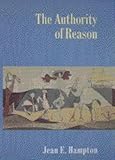The authority of reason / Jean E. Hampton ; edited by Richard Healey.
Material type: TextPublication details: Cambridge ; New York : Cambridge University Press, 1998.Description: xii, 310 p. ; 24 cmISBN:
TextPublication details: Cambridge ; New York : Cambridge University Press, 1998.Description: xii, 310 p. ; 24 cmISBN: - 0521554284
- 9780521554282
- 0521556147 (pbk.)
- 9780521556149 (pbk.)
- ARCH YNDC 170.42 H232A
- BJ1458.5 .H36 1998
| Item type | Current library | Collection | Call number | Status | Date due | Barcode | |
|---|---|---|---|---|---|---|---|
 Archives
Archives
|
SAIACS Archives Room | Yandell Collection | ARCH YNDC 170.42 H232A (Browse shelf(Opens below)) | Not for loan | 064421 |
Includes bibliographical references (p. 293-300) and index.
Pt. I. Science and Objective Norms. 1. Naturalism and Moral Reasons. 2. The Anatomy of a Reason. 3. Reasons' Authority -- Pt. II. Instrumental Reason. 4. Instrumental Reasons. 5. Why Instrumental Reasoning Isn't Instrumental. 6. Instrumental Reasoning and the Methodology of Science -- Pt. III. Reasons and Reasoning. 7. Expected Utility Theory and Instrumental Reasoning. 8. Expected Utility Theory and Consequentialism. 9. Toward a "Postnaturalist" Theory of Reasons.
The Authority of Reason argues against much contemporary orthodoxy in philosophy and the social sciences by showing why objectivity in the domain of ethics is really no different from the objectivity of scientific knowledge. Many philosophers and social scientists have challenged the idea that we act for objectively authoritative reasons. They have argued that there is no place for such objectively authoritative reasons in a scientific account of the world. For them, the only acceptable reasons are those that operate through a person's contingent desires and preferences. Jean Hampton takes up the challenge by undermining two central assumptions of this contemporary orthodoxy - that one can understand instrumental reasons without appeal to objective authority, and that the adoption of the scientific worldview requires no such appeal. Rejection of these assumptions opens the way for a post-naturalist theory of the objective authority of reasons. In The Authority of Reason, Hampton examines moral realism, the general nature of reason and norms, internalism and externalism, instrumental reasoning, and the expected utility model of practical reasoning. Jean Hampton's untimely death in 1996 prevented her from completing two of the chapters, which have been left in the form of sketches. The work has been edited for publication by Richard Healey. Even in this slightly incomplete form, the book will prove to be a seminal work in the theory of rationality and will be read by a broad swath of philosophers and social scientists.
There are no comments on this title.

